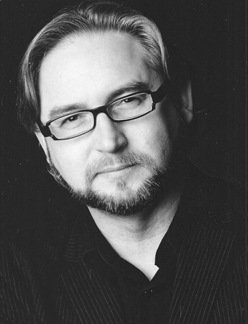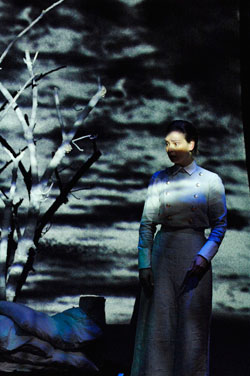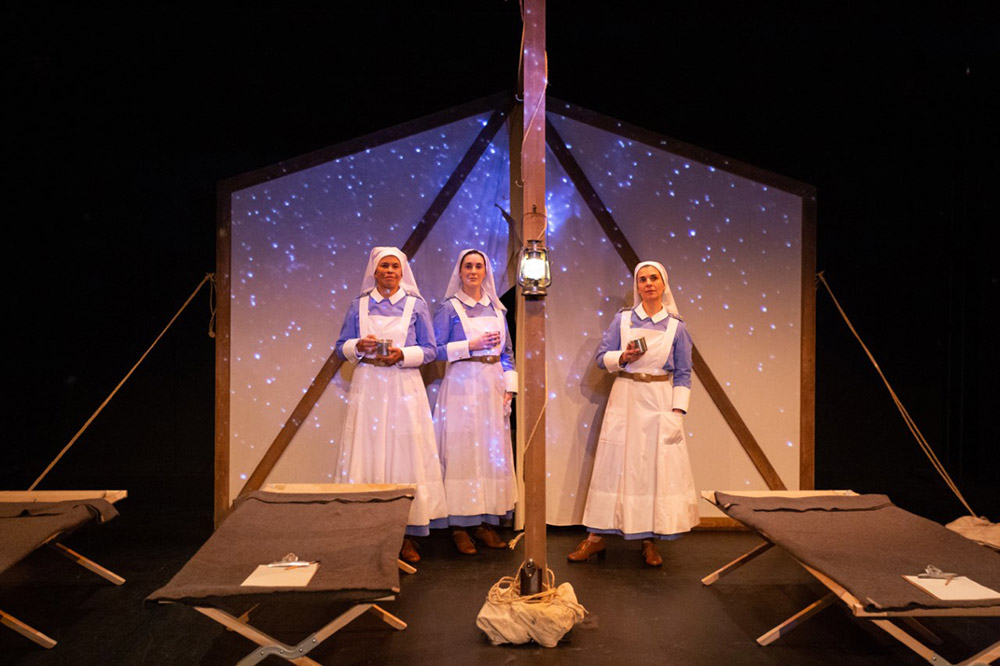Canadian Theatre Encyclopedia
Thiessen, Vern

Photo by Nicholas Seiflow
Playwright, actor, dramaturg, director, and theatre educator, born in 1964. Vern Thiessen grew up in a Mennonite family in Winnipeg, Manitoba, graduated from the University of Winnipeg in 1985, and from the MFA playwriting program at the University of Alberta Department of Drama in 1992.
From 1993-96 he was Artistic Coordinator of Drama at Lakehead College in Lloydminster, Alberta. He was playwright-in-residence at Workshop West Theatre, where he co-founded the Playwrights Garage Development Program with Ron Jenkins, and at the Blue Heron Arts Centre in New York. He has also been an Honorary Research Fellow in Playwriting at the University of Alberta. He was the literary liaison for the Alberta Foundation for the Arts, President of the Playwrights Guild of Canada from 2002-04, President of the Writers Guild of Alberta, and an Artistic Associate of Dramaturgy and Play Development at the Citadel Theatre for five years until 2006. From 2006-07, he was playwright-in-residence at the Citadel.
Thiessen has written for stage, radio, and television. His plays tackle ethical conundrums and conflicts on a personal and political level-–from the moral repercussions of the eternal triangle to the consequences of the invention of chlorine gas and splitting the atom. The style of his plays ranges from confessional monologue to Theatre of the Absurd to historical/epic, evoking complex emotions through poetic language.
He has said of his writing that the playwright must have the courage to put lead characters that he likes in the worst possible situations that bring out their humanity; they incur great loss and experience great hope. As in all good tragedies, they learn too late what their faults are.
Thiessen’s first produced play, The Courier (premiered 1988, The Theatre Centre, Toronto, directed by Larry Desrochers), is a monologue spoken by a young Mennonite courier from the Russian Ukraine as he reconsiders his role in the Nazi army in the Second World War. Performed by the author, The Courier was produced at the Edmonton International Fringe Festival and across the country. It was adapted for radio and broadcast on “Theatre of the Air” on CKUA.

Thiessen has since written a considerable body of work including: The Resurrection of John Frum (1990, National Arts Centre, directed by Gill Osborne and subsequently performed on the Canadian Fringe Circuit in 1999 by the Landlocked Theatre Company); I Fell in Love with an Eel (1991, Edmonton Fringe Festival, directed by the author); Cressida (1994, Workshop West Theatre, directed by Gerry Potter); Dawn Quixote (1995, Quest Theatre, directed by Duval Lang, subsequently produced at Globe Theatre); Blowfish (1996, Northern Light Theatre, directed by DD Kugler, published by Playwrights Canada Press); Apple (2000, Springboards New Play Festival, and 2002, Workshop West, directed by Ron Jenkins, published by Playwrights Canada).
Thiessen's historical morality play, Einstein’s Gift premiered at the Citadel Theatre in 2003. Directed by David Storch, it was enacted by Edmonton's best theatrical talent, including James MacDonald as Einstein, Michael Spencer-Davis as Haber, Julien Arnold as Otto, Stephanie Wolfe as Clara, and Daniela Vlaskalic as Lotta. Set and lighting were by Bretta Gerecke, costumes by Narda McCarroll. Thiessen explores the tragic consequences of political expropriation of the creative imagination for nationalistic ends. He compares the philosophies and beliefs of physicist Albert Einstein and chemist Fritz Haber in terms of their scientific research, and the ironic and tragic consequences of their work. Haber is a complex, paradoxical subject - a German Jew who converted to Christianity in order to retain his university position and advance in his career; a Nobel Prize winner and a war criminal; and an idealist who believed in the practical application of ideals. His life is framed as a memory play, beginning in 1945 with Einstein as narrator recalling his debates with Haber over a period of forty years, from their first meeting in Germany in 1905 to their final meeting in 1934. Both have engaged in scientific research that has resulted in the horrific destruction of human lives: Einstein’s work on nuclear chain reactions fueled the construction of the atomic bomb; Haber’s work on nitrogen as a fertilizer was put to a horrific use as chlorine gas in the First World War, and his work on the pesticide Zyklon B was exploited by the Nazis in the manufacture of gas for the death camps. In the play, Einstein extols the primacy of the intellect in research, and strives to be free of nationalistic and religious dogma while retaining his Jewish identity: “what man thinks and how he thinks, and not what he does or suffers. . . . we must practice science and leave goodness to God.” (46). Haber believes that his research should have a practical application, and serve the “greater good” of the state. The play also underscores the importance of hope, belief, and freedom for imaginative creativity. But, in the words of Einstein, “[w]e require a new way of thinking if we are to survive” (91). It is also Einstein who poses the final question in the play: Should creativity be stifled or silenced when it can have destructive consequences? The title of the play is ironically appropriate on several levels: the German word, gift, means “poison” in English; Einstein’s legacy, even more so than Haber’s, is a mixed one. His final gifts to Haber are a Kipa and a Tallis, for his journey to Palestine, where he hopes to find a place to die, having been betrayed by Germany, the nation for which he has sold his soul. According to Thiessen, their “gift” to the audience is their struggle to understand what they believe: "I believe we are all like Einstein and Haber at some level. Even if we are not all brilliant physicists or ambitious chemists, I believe we all have hopes and dreams, and conversely, that we all wrestle with doubt. And if we follow Einstein and Haber’s lead, we will see this doubt and crises of faith as a gift. (Post Script 105). Einstein's Gift has been produced over twenty-five times in Canada the US, and was published by Playwrights Canada in 2003.
Shakespeare’s Will has been one of Thiessen's most popular works. It premiered in 2005, at the Citadel Theatre in association with Free Will Players, directed by Geoffrey Brumlik, and is published by Playwrights. It was produced at the Stratford Festival in the Studio Theatre in 2011, with Seana McKenna as Anne Hathaway, recalling her life with her famous husband, and his final legacy to her. It has enjoyed over 100 productions, including in New Zealand and New York, and translated into German.
In 2005, Thiessen's one-act play, Back to Berlin, premiered with the Solo Collective Theatre in Vancouver. It revisits the courier of his 1988 monologue from the perspective of the courier’s Canadian son.
Thiessen's epic memory play, Vimy (Citadel Theatre, 2007, dir. James MacDonald) recreates a seminal nation-building moment in WWI in terms of the lives of four men from different parts of Canada, and their interaction with the nurse who cares for them.
His black comedy, Lenin's Embalmers, premiered in New York, with a Canadian opening at the Winnipeg Jewish Theatre (Oct 2010) and Harold Green Jewish Theatre (Nov 2010). In this absurdist play two reluctant Jewish Russian chemists are charged by Joseph Stalin with preserving the dated remains of Lenin, the communist revolutionary leader. Of the Winnipeg premiere, Kevin Prokosh wrote: "That's where the conventional ends in what must be the first stage comedy celebrating embalming. No matter the morbid subject matter, Lenin's Embalmers is one of the liveliest, most unpredictable and fun nights of theatre the Winnipeg Jewish Theatre has ever presented" (Winnipeg Free Press 16 Oct 2010).
His adaptation of Somerset Maugham's complex novel about obsessive love, Of Human Bondage (dir. Albert Schultz) opened at Soulpepper Theatre Company in April 2014, and won seven Dora Mavor Moore Awards, including one for Outstanding New Play, and another for Outstanding Production. It was remounted in April 2015, and in February 2017, and then performed in New York in July 2017.
In September 2015, his musical adaptation of the satirical political novel, The Best Laid Plans by Terry Fallis was produced by Touchstone Theatre (dir. Katrina Dunn), just in time for the Federal election. It won a Vancouver Ovation Award for Outstanding Professional Production of musical theatre.
Pugwash, featuring the disparate participants from the US, USSR, Japan, UK, Canada, and Australia who attended the first international peace conference held in Pugwash, Nova Scotia in 1957, premiered at Ship's Company Theatre in July 2017. The perspective is that of local young boy and girl, watching their future unfold. It is published by Playwrights Canada Press (2019).
Bluebirds, the moving portrait of three nurses working in a field hospital in France during WWI, was first performed as a one-act play in 2019 at the Edmonton International Fringe Festival by Wishbone Theatre, then developed with Theatre New Brunswick as a full-length play, and streamed on-line with the support of Belfry Theatre on Remembrance Day, 2020, during the Covid-19 pandemic. It was directed by the AD of Theatre New Brunswick, Natasha MacLellan, who also directed the stage premiere at Open Stage Theatre, TNB in October, 2022. In 2024, this production toured theatres in the Maritimes.

With Yvette Nolan, he wrote a culturally multi-layered adaptation of The Diviners by Margaret Laurence, that premiered at the Patterson Theatre, Stratford Festival in September 2024.
Thiessen has written six plays for young audiences, including Bird Brain for the Citadel Theatre and Rich--a musical. He drew on his Mennonite background for Bello, a story of an orphan boy who is rescued in a snow storm by an old woman living in a burned-out barn, whom the community has labelled a witch. He discovers that they have bereavement in common. Bello was performed in both French and English for Concrete Theatre's Sprouts festival, in a co-production with UniTheatre in 2017, and toured schools throughout Alberta. It was then produced by Toronto’s Young People’s Theatre for a two-week mainstage run, with both English and French performances.
His screenplay for Samurai Swing, a short film by Mieko Ouchi won the 1998 National Screen Institute Drama Prize.
Thiessen is the recipient of many awards. Both Apple and Chaos (written with Will Zaichkowski) won the Alberta Culture Play Award, and Apple was awarded the Elizabeth Sterling Haynes Awards (Sterling Awards) for Outstanding New Play in 2002. Einstein’s Gift won the Governor General’s Award for drama in 2003. Shakespeare’s Will won a Sterling for Outstanding Production in 2005. In 2011, Lenin's Embalmers was nominated for a Governor General’s Award. Bello won a Sterling Award for Artistic Achievement in Theatre for Young Audiences in 2017. Thiessen has also been awarded the City of Edmonton Arts Achievement Award, and the University Alumni Award for Excellence.
From September 2014 to 2019, Thiessen was Artistic Director of Workshop West Theatre. His mandate was to build community: "I want people to see us as a company that [is] responding to the unheard voices of Edmonton. I want us to be a playwright's theatre again and to use writers as lightning rods, shit disturbers, comedians, activists — however the individual writer wanted to plug into the community" (Avenue, April 2016).
In June, 2022, he relocated to his home town of Winnipeg to assume the role of School Director for Manitoba Theatre for Young People, creating, developing, and managing the education and training programs for young people.
He is married to novelist and filmmaker, Susie Moloney.
Website: https://www.vernthiessen.com/
Profile by Anne Nothof, Athabasca University
Last updated 2025-06-15

